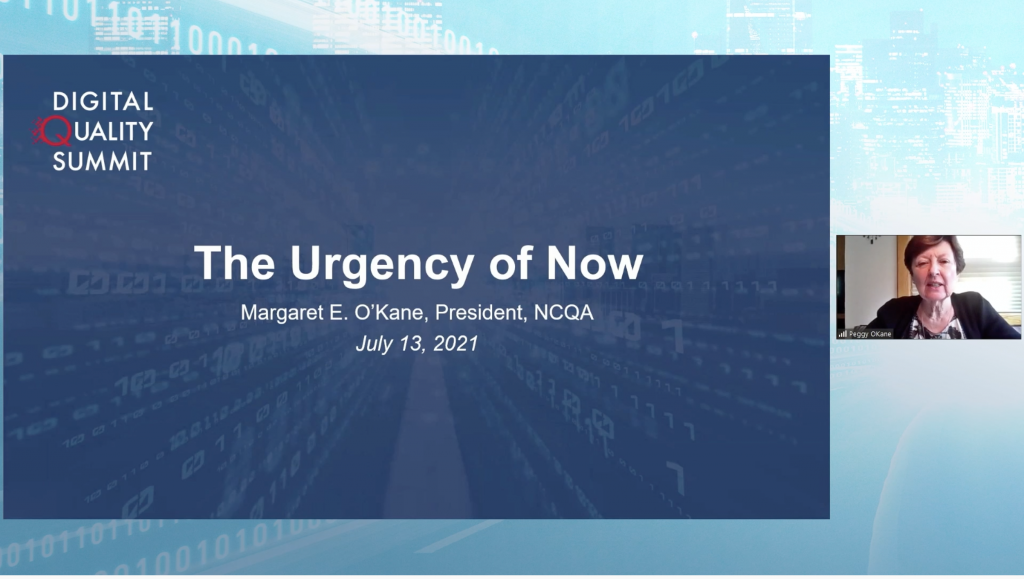Kickoff: NCQA President Opens Digital Quality Summit
July 15, 2021 · Matt Brock
The Digital Quality Summit is underway. The three-day event kicked off with an exciting opening session including opening remarks from NCQA’s president and founder, Peggy O’Kane.
O’Kane, the nation’s leading health care quality advocate for 30 years, told Summit attendees, the time is now for transforming the health care quality matrix to a more timely, more informative, better coordinated digitally based system to measure quality and drive improvement.
Why so urgent? Well, there are perils if the system is not updated, but it’s the opportunities that O’Kane urged the online audience to consider.
“We have coming onto the field, new players who are going to deliver care in new ways,” O’Kane said. “And some of those are going to change the paradigm of medicine, I hope in a positive way.”
O’Kane sees readily available data as the urgent solution. But not just data. The almost real-time data must be accompanied by accountability and incentive models that make people want to use the data to manage care—to make sure every patient gets what he or she needs. O’Kane calls it a “holistic patient-centered process.”
“One of the downsides of all the new players coming on to the field is that many times, we’re seeing single point solutions come out of the tech sector,” O’Kane said. “And if those solutions are not integrated into a holistic, patient-centered process of care, much of the opportunity will be squandered.”
“And while the term patient-centered has been used loosely, I think we’re about to see digital provides an opportunity for care to be seriously patient-centered, and possibly engaging patients in a way that’s never been possible before.”
It’s no coincidence O’Kane made the digital call to action at the Digital Quality Summit. The annual conference aimed at defining the digital future has always been collaboration between NCQA and HL7 since the organizations united to build the digital ecosystem four years ago.
The Equity Opportunity
Perhaps the biggest opportunity for improvement is health equity. The pandemic exposed how the burden of illness falls disproportionately on different groups.
“That really has, I think, made us all strengthen our resolve to address inequity, not as a side issue, but as an important part of the quality agenda,” O’Kane said. “Quality care is equitable care.”
“Recently we’ve gotten new life expectancy data that are really shocking. I think the losses in life expectancy couldn’t be more stark as a whole society. But look at the differentials,” O’Kane said of the 2020 results. “White people lost an expected one year of life. Black people lost two years of life expected, and Hispanics, three years of life. If that doesn’t really starkly illustrate the urgency of addressing health equity, I don’t know what does.”
“When it comes to equity, I think that there’s a big elephant in the room, and I just need to call it out. Economic inequality underlies a lot of what’s going wrong with people’s health.”
“Can the healthcare system change that?” she asked. “I think we as citizens can advocate for better closing some of these economic gaps. But what health care has, is a moral responsibility to meet the patient where they are and take care of the health care part of the equation.”
She noted social determinants of health—education, job status, family and social support, income, and community safety—all impact health care’s accessibility and effectiveness.
“If there are ways to close those social determinant gaps, you have a much better fighting chance of having the health care itself be effective,” she added.
Good Things from Gravity and CMS
O’Kane sees a solution in HL7’s Gravity Project because it aims to set a common language and framework to collect data on the drivers of health or the social determinants.
“We know that we don’t have common definitions of data, we have a tower of Babel problem. The gravity project has marched right into a very complicated area that is not within the normal bailiwick of healthcare up until now… We are working with the gravity project too, to make data transfer easier and to lower the reporting burden.”
Four years after the first Digital Quality Summit, the work is getting a boost from the Centers for Medicare and Medicaid Services (CMS) as well. Earlier this summer,
CMS asked health care innovators to provide more information about their digital quality improvement work. The Centers have also officially defined digital quality measures as software that processes digital data to produce a measure or a measure score. And CMS recently committed to use HL7’s FHIR platform for current eCQMs, electronic clinical quality measures and transition to digital quality measures by 2025.
“That is a tall order,” O’Kane surmised in her closing. “We are very, very eager and excited to be working with CMS and all the others who will be necessary to the success of this transition.”
A call to collaborative action opens the Digital Quality Summit… You’ll see here just what that yields throughout the week. If prior Summits are an indication, expect leaps forward in the next few days.








